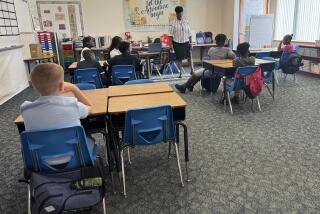L.A. Schools Ease Fears on Closures for Disabled
In response to strong objections from parents, the Los Angeles Unified School District has made several key changes to an impending legal settlement aimed at overhauling special education for the system’s 65,000 disabled students
A new version of the agreement released Friday softens language that implied that 18 of the district’s special education schools could close, a possibility that prompted protests from scores of parents during public hearings last month.
The district now says it will put all disabled students in the classroom setting most appropriate for them, with the goal of integrating them with non-disabled students whenever possible.
“We’re talking about one system of education for all children that has a variety of options,” said Sherman Oaks attorney Robert M. Myers, who filed the class action lawsuit that prompted the settlement. “This is making sure there is not a separate and unequal system of education for the disabled.”
The suit was brought by parents who claimed their children were getting lost in the district’s vast bureaucracy and were receiving an inferior education. Others wanted to end the segregation that held their children in separate schools or classrooms. In agreeing to settle the suit, the district admitted it was in violation of federal and state laws that protect students with disabilities.
The decree’s most tangible commitments call for hiring an assistant superintendent for special education and creating a computer system to track the progress of all students, including those in special education.
Beyond that, the agreement is more philosophical than practical, laying out a clear mission to place more special education students on regular campuses and in regular classrooms.
The latest amendments to the settlement assign parents to committees that will decide how the plan will be carried out and create a community panel to monitor progress.
Not everyone is satisfied with the changes, however, and another round of objections is expected today during a 4 p.m. public meeting at district headquarters. If the school board approves the settlement at the end of that meeting, it will be filed with U.S. District court by Friday.
Members of the group RESPECT--parents, students and community members who launched the most organized opposition--say they are pleased with some parts of the agreement but have lingering concerns about the level of parent participation, one of their key demands.
“I think there has been movement in a positive direction in terms of taking into account the views of parents,” said attorney Peter Schey, who is representing the group pro bono because he is one of them: his fifth-grade daughter has a neurological disorder that keeps her in a wheelchair.
RESPECT also is concerned that a proposed five-year moratorium on other class action suits over special education is too long and a 10-day window for objections after the decree is filed in federal court is too short, Schey said.
Liz Spencer, the group’s founder, said parents of disabled children “bring to the table creativity and knowledge and more support for this school system than anyone really realizes.” Spencer’s son Jace has Down’s syndrome but is in a regular first-grade class on the Westside.
Spencer said it may be too soon to finalize the settlement today and that a rush to approval puts parents at a disadvantage, especially when the district had nearly two years to mull over the agreement with consultants and attorneys.
Another group of parents--those who support separate schools and classrooms for their children--also has complained that their views were not given a fair hearing.
Attorney Bonny Garcia, who represents the school district, said parents misunderstood the plan and that the district never intended to immediately close all special education schools.
Garcia said some experts estimate that Los Angeles has double the reasonable number of disabled children attending segregated sites--either at the 18 district special education schools or at numerous special private schools paid for by taxpayers.
Removing any hint of immediate school closures from the settlement would allow integration to gradually unfold, Garcia said.
In the panic about closures expressed at the January hearings, district and plaintiffs’ attorneys heard another disturbing message: Parents reported shying away or pulling back from mainstream situations because teachers and other students had been inhospitable to the plan at best, cruel at worst.
“This struck us as similar to sexual harassment in the workplace,” attorney Myers said.
From that observation came the consent decree’s new anti-harassment clause, which calls for the district to “take all steps necessary to eradicate educational environments that are hostile to students with disabilities.” Suggested techniques are increased staff training and sensitivity classes for students.
More to Read
Sign up for Essential California
The most important California stories and recommendations in your inbox every morning.
You may occasionally receive promotional content from the Los Angeles Times.










